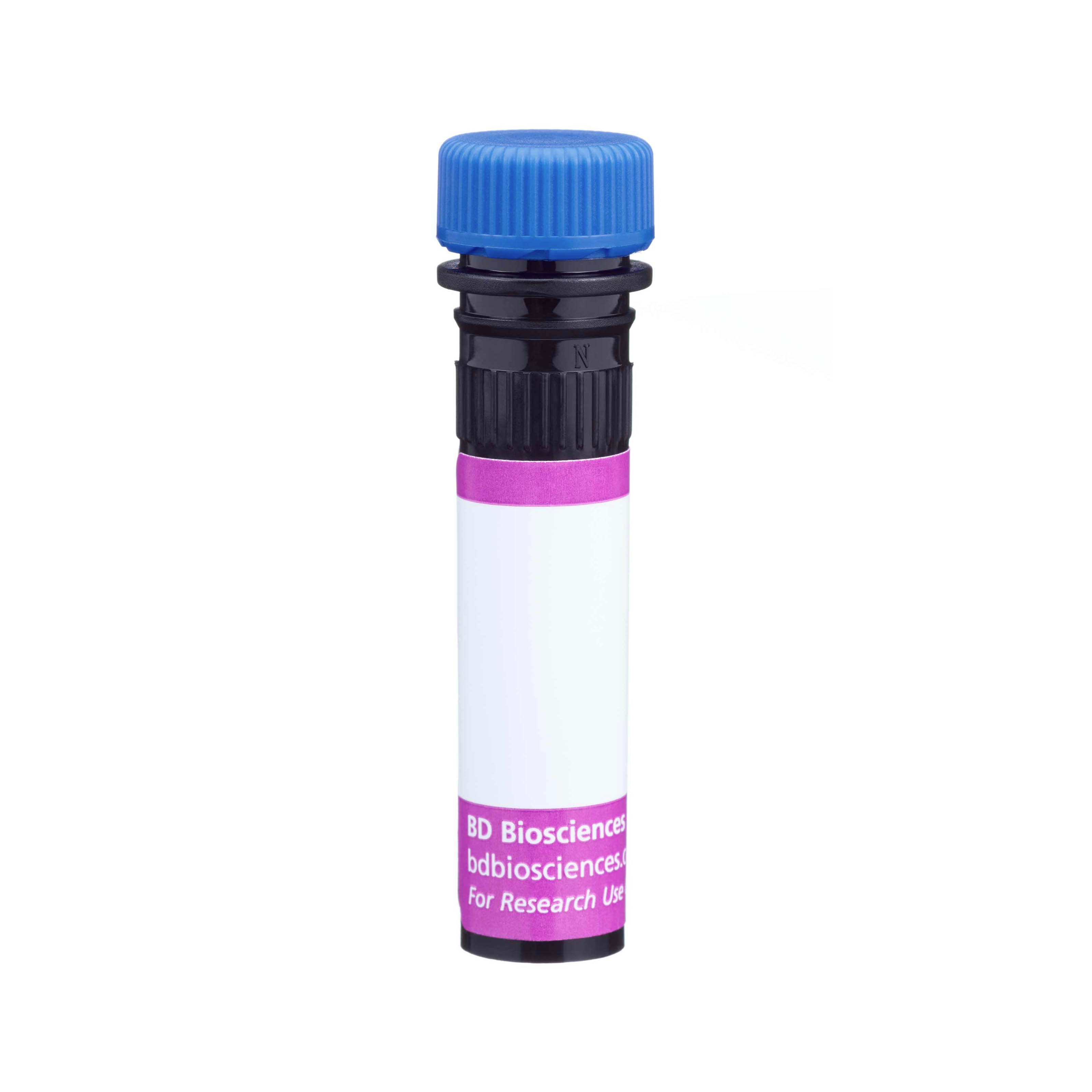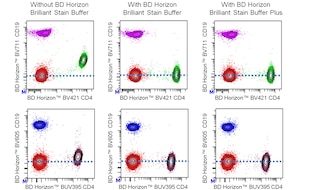Old Browser
Looks like you're visiting us from {countryName}.
Would you like to stay on the current country site or be switched to your country?




Two-color flow cytometric analysis of CD127 expression on Mouse spleen cells. Splenic leucocytes from a C57BL/6 Mouse were preincubated with Purified Rat Anti-Mouse CD16/CD32 antibody (Mouse BD Fc Block™) [Cat. No. 553141/553142]. The cells were then stained with Alexa Fluor® 647 Rat Anti-Mouse CD3 antibody (Cat. No. 557869) and either BD Horizon™ BV421 Rat IgG2a, k Isotype Control (Cat. No. 562602; Left Plot) or BD Horizon™ BV421 Rat Anti-Mouse CD127 antibody (Cat. No. 566377; Right Plot) at 0.5 μg/test. Two-color flow cytometric contour plots showing the correlated expression of CD127 (or Ig Isotype control staining) versus CD3, were derived from gated events with the forward and side light-scatter characteristics of viable leucocytes. Flow cytometric analysis was performed using a BD LSRFortessa™ X-20 Flow Cytometer System. Data shown on this Technical Data Sheet are not lot specific.


BD Horizon™ BV421 Rat Anti-Mouse CD127

Regulatory Status Legend
Any use of products other than the permitted use without the express written authorization of Becton, Dickinson and Company is strictly prohibited.
Preparation And Storage
Recommended Assay Procedures
BD® CompBeads can be used as surrogates to assess fluorescence spillover (compensation). When fluorochrome conjugated antibodies are bound to BD® CompBeads, they have spectral properties very similar to cells. However, for some fluorochromes there can be small differences in spectral emissions compared to cells, resulting in spillover values that differ when compared to biological controls. It is strongly recommended that when using a reagent for the first time, users compare the spillover on cells and BD® CompBeads to ensure that BD® CompBeads are appropriate for your specific cellular application.
For optimal and reproducible results, BD Horizon Brilliant Stain Buffer should be used anytime BD Horizon Brilliant dyes are used in a multicolor flow cytometry panel. Fluorescent dye interactions may cause staining artifacts which may affect data interpretation. The BD Horizon Brilliant Stain Buffer was designed to minimize these interactions. When BD Horizon Brilliant Stain Buffer is used in in the multicolor panel, it should also be used in the corresponding compensation controls for all dyes to achieve the most accurate compensation. For the most accurate compensation, compensation controls created with either cells or beads should be exposed to BD Horizon Brilliant Stain Buffer for the same length of time as the corresponding multicolor panel. More information can be found in the Technical Data Sheet of the BD Horizon Brilliant Stain Buffer (Cat. No. 563794/566349) or the BD Horizon Brilliant Stain Buffer Plus (Cat. No. 566385).
Product Notices
- Please refer to www.bdbiosciences.com/us/s/resources for technical protocols.
- Since applications vary, each investigator should titrate the reagent to obtain optimal results.
- An isotype control should be used at the same concentration as the antibody of interest.
- Source of all serum proteins is from USDA inspected abattoirs located in the United States.
- Caution: Sodium azide yields highly toxic hydrazoic acid under acidic conditions. Dilute azide compounds in running water before discarding to avoid accumulation of potentially explosive deposits in plumbing.
- For fluorochrome spectra and suitable instrument settings, please refer to our Multicolor Flow Cytometry web page at www.bdbiosciences.com/colors.
- BD Horizon Brilliant Violet 421 is covered by one or more of the following US patents: 8,158,444; 8,362,193; 8,575,303; 8,354,239.
- BD Horizon Brilliant Stain Buffer is covered by one or more of the following US patents: 8,110,673; 8,158,444; 8,575,303; 8,354,239.
- Please refer to http://regdocs.bd.com to access safety data sheets (SDS).
- For U.S. patents that may apply, see bd.com/patents.
Companion Products






The A7R34 monoclonal antibody specifically binds to mouse CD127 which is also known as the Interleukin-7 Receptor alpha chain (IL-7Rα). CD127 associates with CD132 (common γ chain) to form a high-affinity signaling IL-7R complex that mediates the biological functions of IL-7. CD127 can also complex with the Thymic Stromal Lymphopoietin Receptor (TSLPR) subunit to bind and mediate cellular responses to TSLP. CD127 is a 65-75 kDa type-I transmembrane protein that belongs to the hematopoietin receptor and the Ig gene superfamilies. Mice lacking CD127 display profoundly impaired development of the B and T lymphoid cell lineages, but display no obvious nonlymphoid abnormalities. CD127 is expressed on common lymphoid progenitors and early stages of B lineage development in the bone marrow, the earliest thymocyte progenitors, CD4-CD8- double-negative and CD4+ and CD8+ single-positive thymocytes, naïve and memory T lymphocytes, γδ TCR+ T cells, thymic NK cells, and bone marrow stromal cells. CD127 is downregulated upon activation of naïve T cells and CD127 re-expression identifies effector cells that subsequently differentiate into memory T cells. The A7R34 antibody blocks IL-7 binding to CD127. This antibody has been used in both in vitro and in vivo studies to define the biological roles played by CD127.

Development References (4)
-
Brown VI, Hulitt J, Fish J, et al. Thymic stromal-derived lymphopoietin induces proliferation of pre-B leukemia and antagonizes mTOR inhibitors, suggesting a role for interleukin-7Ralpha signaling.. Cancer Res. 2007; 67(20):9963-70. (Clone-specific: Inhibition, Neutralization). View Reference
-
Hikida M, Nakayama Y, Yamashita Y, Kumazawa Y, Nishikawa SI, Ohmori H. Expression of recombination activating genes in germinal center B cells: involvement of interleukin 7 (IL-7) and the IL-7 receptor.. J Exp Med. 1998; 188(2):365-72. (Clone-specific: Functional assay, Inhibition, In vivo exacerbation). View Reference
-
Hozumi K, Kondo M, Nozaki H, et al. Implication of the common gamma chain of the IL-7 receptor in intrathymic development of pro-T cells. Int Immunol. 1994; 6(9):1451-1454. (Clone-specific: Functional assay, Inhibition). View Reference
-
Sudo T, Nishikawa S, Ohno N, et al. Expression and function of the interleukin 7 receptor in murine lymphocytes. Proc Natl Acad Sci U S A. 1993; 90(19):9125-9129. (Immunogen: Flow cytometry, Functional assay, Immunoprecipitation, Inhibition, In vivo exacerbation, Neutralization). View Reference
Please refer to Support Documents for Quality Certificates
Global - Refer to manufacturer's instructions for use and related User Manuals and Technical data sheets before using this products as described
Comparisons, where applicable, are made against older BD Technology, manual methods or are general performance claims. Comparisons are not made against non-BD technologies, unless otherwise noted.
For Research Use Only. Not for use in diagnostic or therapeutic procedures.
Refer to manufacturer's instructions for use and related User Manuals and Technical Data Sheets before using this product as described.
Comparisons, where applicable, are made against older BD technology, manual methods or are general performance claims. Comparisons are not made against non-BD technologies, unless otherwise noted.
Report a Site Issue
This form is intended to help us improve our website experience. For other support, please visit our Contact Us page.